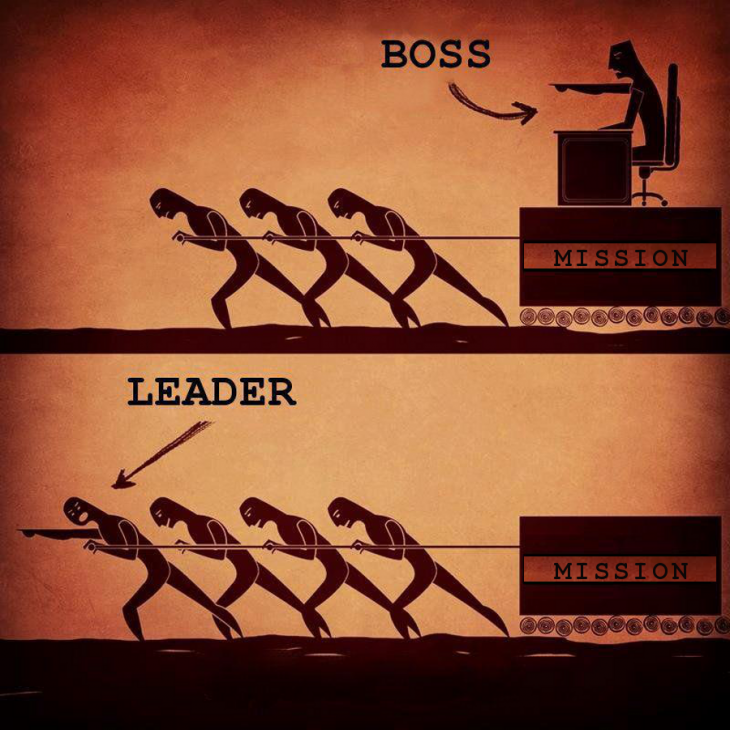Being a leader is different from what most of us think it is. Most leaders are actually managers in disguise.
Sarah was excited to be promoted to sales director. After all, she has been in sales for almost eight years and has always been at the top of the leader board. She knows she will really be able to help the other salespeople with their sales, and they already look up to her since she has always been a top performer.
Jeff comes to Sarah one day and asks her what to do about a customer who doesn’t seem to be making a decision, though he really likes their product.
“I’ve tried everything,” he confesses. “I’ve offered free delivery, a 10 percent discount – I’m just stumped.”
Sarah asks: “Can you get a meeting with the decision makers?”
Jeff says he thinks he can and Sarah says: “I’ll come with you and we’ll get it done!”
Jeff knows she will, and is eagerly dialing the phone and spending the commissions he is confident Sarah will help him win.
Real leadership is not managing. Telling someone what to do is absolutely not leadership. Neither is doing it for them. This reminds me of that old saying: “Take someone fishing and they’ll eat for a day. Teach them how to fish and they eat for a lifetime.” The idea of leadership is to get someone to self-realize what they can and should do to make some decisions on their own. Once they feel good about the answer they are looking for, they will continue to use that information and not have to “check in” with you before making that decision.
We often believe that, to be a good leader, you need to be outgoing and charismatic. That is often not the case. You may remember the old E.F. Hutton commercial. If you’re not familiar, it is a room of people talking, but, all of a sudden, E.F. Hutton has something to say and everyone stops to listen. Often, what happens is being a bit humble and a very good listener seems to really work well when it comes to leadership.
Some tips to create true leadership:
- Stop being a parent to your salespeople. If you think about how we grew up, we asked our parents questions (as curious kids do) and, as parents, they answered our questions immediately. As parents, they wanted us to know the answer. That’s fine, but we are not parents to our salespeople. Our job is not only to get the answer to them, but also to get them to engage with us by thinking about the answer themselves. When they engage in the process with us, it becomes more their idea.
- Help them feel empowered. The next time a salesperson says “What should I do about?” or “How do I …?” try this: “If you couldn’t reach me right now and needed to make a decision, what decision would you make?” The key here is that you should confirm whatever they say and, if it’s not right, you can say: “And in addition to that, you may want to say….” You need to be a soft place to fall so if their answer is wrong using this process, you can’t get upset with them – or they’ll never feel empowered again.
- Let them be involved in setting goals. I am always astonished when sales managers/CEOs set goals for salespeople without getting any of their input. If you want to get them engaged and feeling that the goals are not just for what the company dictates – which, by the way, are most often never met –this process should have the salesperson involved: What are their goals? What kind of money do they want to make and why? What activities will they commit to doing daily, weekly and monthly to achieve them? Give them the responsibility to come up with what they feel their goals should be, and have them put the proactive behaviors behind it. Then, review it together to see if it’s real. If it doesn’t meet your standards, then push them a bit: “Oh, I feel you are better than that. Don’t sell yourself short; lets relook at this.”
- Look realistically at their motivation. Are they making more money than they ever have before? If so, you often find that your salespeople are satisfied with the amount of money they are making, but you aren’ Meaning: The commissions they are making may be great to them, but they aren’t hitting the numbers you need them to hit. Motivation will come from them, not you, so make sure that there is always a carrot. If the carrot stops working, you may need to change the horse.
You can’t motivate anyone to do anything. You can only give them an opportunity to motivate themselves. It may be easier to just do it yourself in the short term, but remember: If you do that now, you will always have to do that. Burnt out much?


